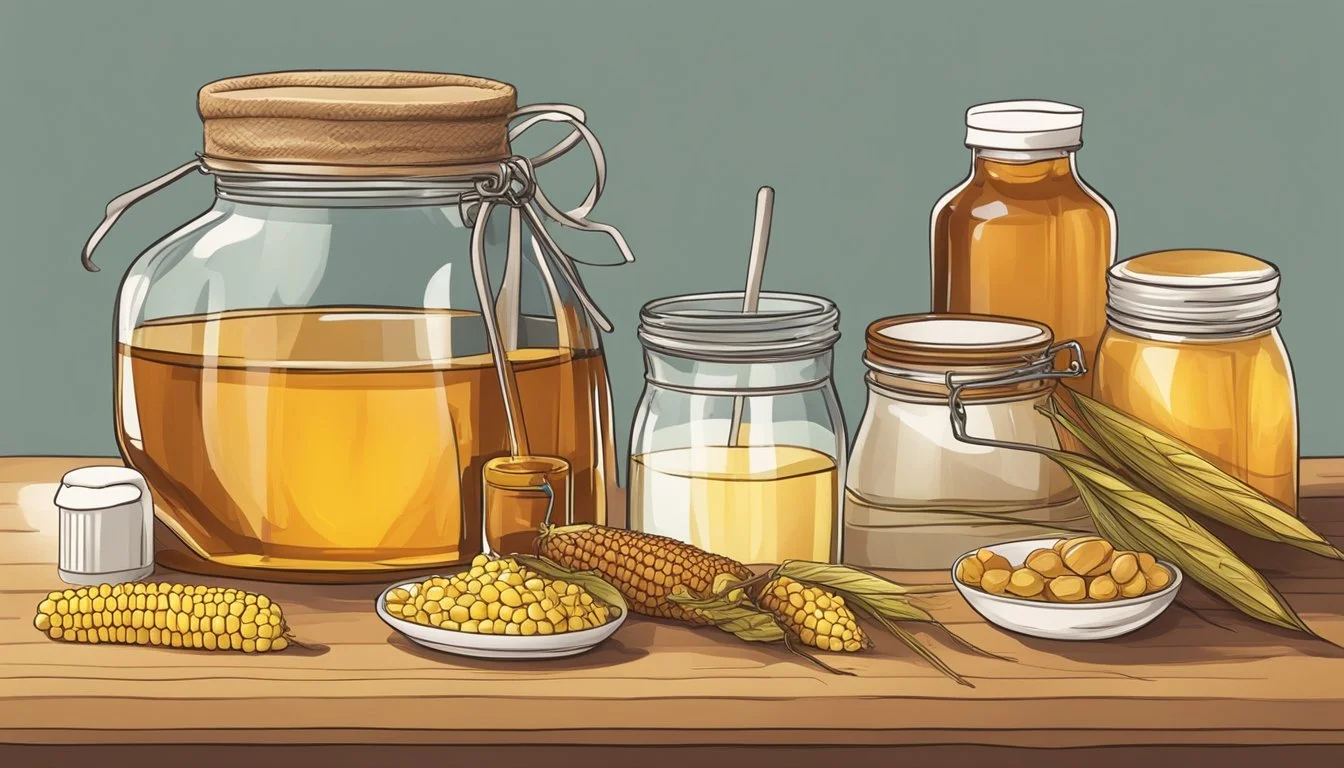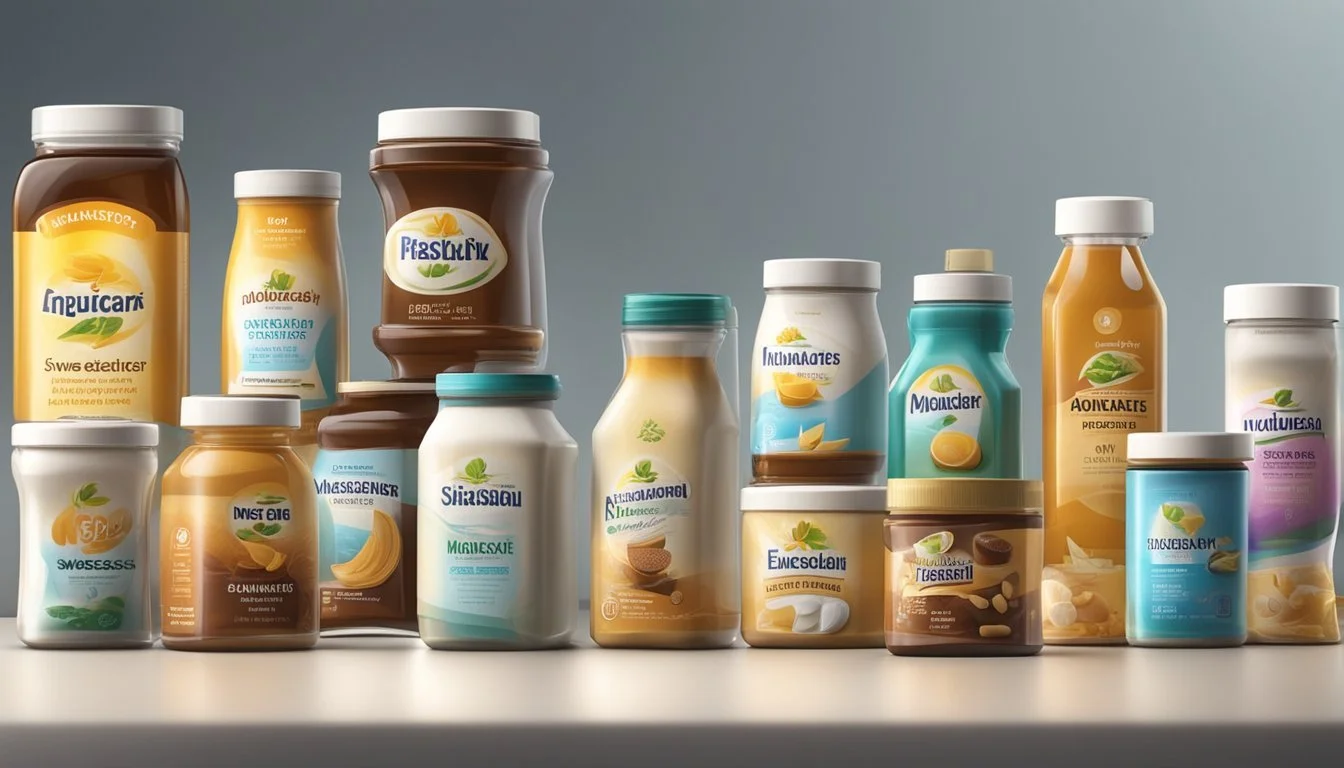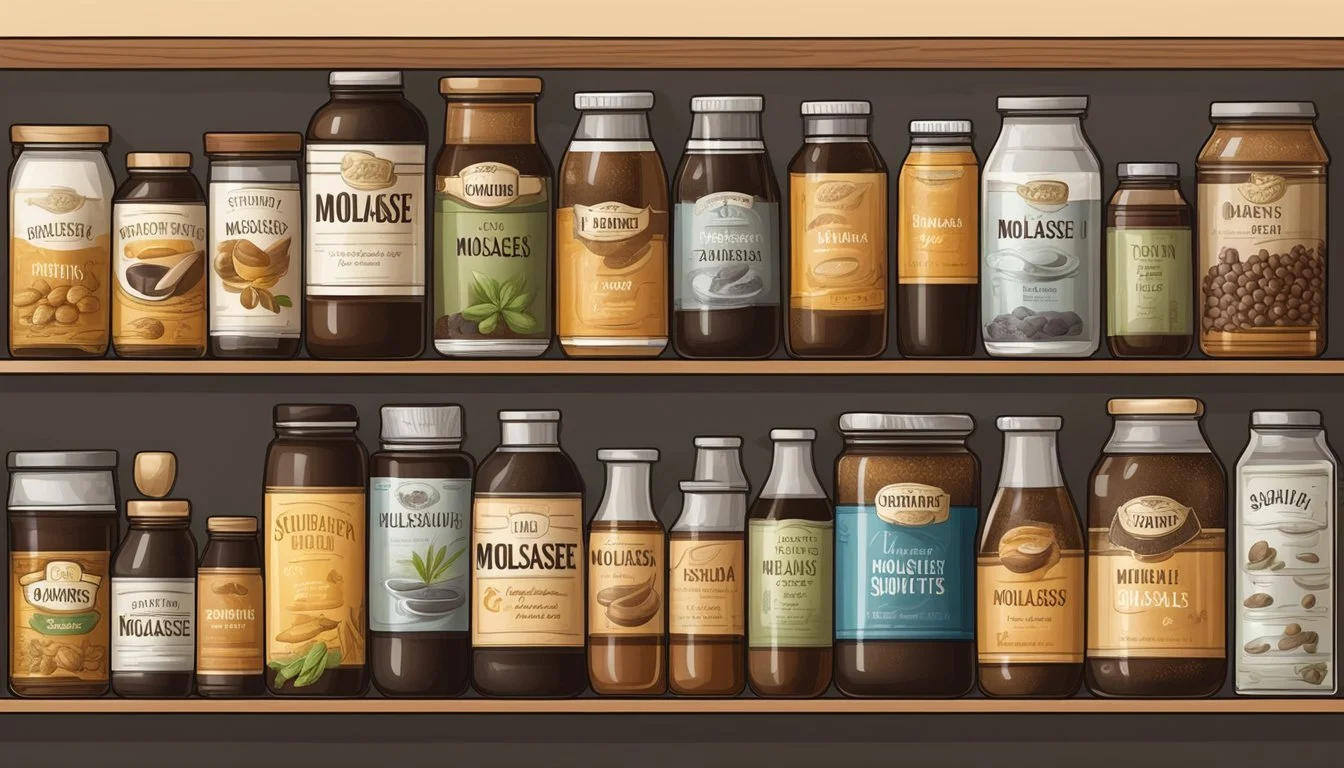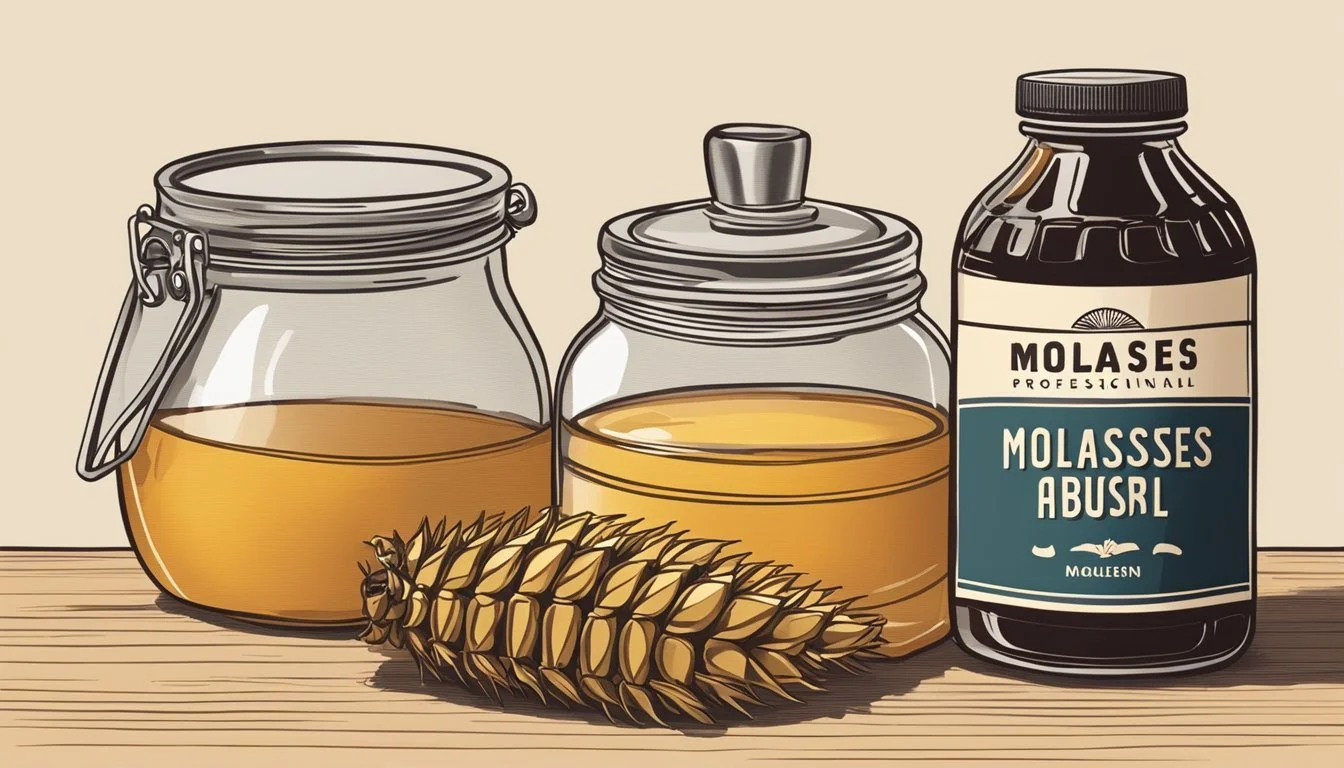Molasses Substitutes
Top Alternatives for Your Recipes
When cooking or baking, stumbling upon an empty jar of molasses can be a stumbling block, especially if it's a key ingredient in the recipe. Molasses, with its thick consistency and rich, caramel-like flavor, is a staple in many sweet and savory dishes. But what happens when a cook finds themselves without this essential ingredient? The culinary world is not at a standstill, as there are several alternatives that can stand in for molasses without forfeiting the integrity of the dish.
Several substitutes match the sweet, yet complex profile of molasses. Brown sugar, for instance, can be used due to its inherent molasses content. This makes it an excellent alternative, offering both sweetness and a hint of the robust flavor that molasses imparts. Honey, maple syrup, and dark corn syrup also make suitable replacements, each adding their unique notes to a dish while providing the necessary sweetness and moisture. Despite these substitutions, a cook should be mindful of how they might slightly alter the final taste and texture of the food.
Understanding Molasses
Molasses is a byproduct of the sugar-making process, offering distinct flavors and nutritional benefits. It is derived from the refining of sugarcane and is utilized in various culinary applications.
Types of Molasses
Light Molasses: Obtained from the first boiling of sugarcane juice, light molasses has the mildest flavor and the highest sugar content. It is light in color and often used in baking.
Dark Molasses: This type is the result of a second boiling and condensation, presenting a bolder flavor. Dark molasses is darker and thicker than light, suitable for gingerbreads and other rich-flavored recipes.
Blackstrap Molasses: The most robust and least sweet, blackstrap molasses comes from the third boiling. It is known for its significant mineral content, particularly iron, calcium, and potassium.
Sulfured vs. Unsulfured: Sulfured molasses involves using sulfur dioxide during extraction, which acts as a preservative. Unsulfured molasses is made from sun-ripened sugarcane with no sulfur added, often leading to a cleaner taste.
Nutritional Content
Molasses contains essential nutrients that contribute to its health benefits. Below is a brief overview of its nutritional components:
Nutrient Content in Molasses Sugar Content Varied; blackstrap has the lowest, light molasses the highest Potassium High in blackstrap molasses, supporting muscle and cardiovascular health Calcium Contributes to bone health and is found in notable amounts, especially in blackstrap Iron Particularly rich in blackstrap molasses, important for red blood cell formation Magnesium Involved in over 300 biochemical reactions in the body, present in molasses Antioxidants Contains antioxidants that may have potential health benefits
Molasses is a valuable sweetener rich in flavor and nutrients, varying across its types. Each type boasts its own specific uses and benefits, offering versatility in the world of sweeteners.
Reasons for Substituting Molasses
In the culinary world, molasses is valued for its rich, caramel-like flavor and deep color, which it imparts to a variety of dishes. However, sometimes a cook must seek out molasses substitutes due to various factors.
Dietary Restrictions
Those with dietary restrictions may need to avoid molasses. For individuals following a low glycemic diet, molasses, despite its nutrients, has a relatively high sugar content which can cause blood sugar spikes. Substitutes such as stevia or monk fruit sweetener, mixed with water to achieve a syrup-like consistency, can be used in place of molasses to reduce sugar intake. Additionally, for those who must adhere to a vegan diet, some types of molasses are processed with animal products, making it necessary to find plant-based alternatives like maple syrup or barley malt syrup.
Availability Issues
Molasses might not always be readily available in all regions or stores. It could also be a seasonal item in some areas, leading to temporary shortages. When this happens, readily available items such as honey, dark corn syrup, or brown sugar can serve as substitutes for molasses in recipes. These alternatives tend to be more common in household pantries and local stores. Here is a simple replacement guide based on the volume of molasses required:
Dark Corn Syrup: Use an equal amount to replace molasses for a similar texture, though the flavor will be milder.
Brown Sugar: Replace 1 cup of molasses with 3/4 cup packed brown sugar, which contains molasses in its composition.
Honey: It offers a similar consistency with a different, but equally rich, flavor profile.
By using these substitutions, cooks can maneuver around the lack of molasses without significantly affecting the outcome of their recipes.
Natural Molasses Substitutes
When seeking a natural alternative to molasses in recipes, one can turn to various natural sweeteners that offer distinct flavor profiles and health benefits. These substitutes can closely mimic the texture and sweetness of molasses and are derived from natural sources.
Honey
Honey is a versatile sweetener with a rich history of culinary use. It offers anti-inflammatory properties and can be a source of B vitamins. The flavor profile of honey is less complex than molasses but still provides a depth of sweetness. When using honey as a substitute, it's advisable to use a slightly smaller amount to prevent overpowering the dish.
Maple Syrup
Maple syrup, made from the sap of maple trees, presents a unique and robust flavor. It shares a similar consistency to molasses and can replace it in a one-to-one ratio in most recipes. Maple syrup imparts a distinct sweetness and is often preferred for its natural origin and flavor.
Agave Syrup
Agave syrup comes from the agave plant and stands out as a liquid sweetener with a high level of sweetness. Its flavor is milder and more neutral compared to molasses, making it suitable for dishes where a subtle sweetness is desired. Because of its concentrated sweetness, one may use less agave syrup than molasses.
Date Syrup
Date syrup is derived from dates and carries a flavor that is rich and caramel-like. This natural sweetener comes with nutritional benefits, including the presence of B vitamins. It can effectively sweeten dishes while offering a consistency similar to molasses, which makes it an appropriate substitute in baking and cooking.
Sugar-Based Molasses Substitutes
Sugar-based substitutes for molasses can provide varying degrees of sweetness and texture. These alternatives are excellent for those seeking to replicate the distinct flavor and moisture content of molasses in baking and cooking.
Brown Sugar
Brown sugar, particularly dark brown sugar, is an ideal replacement for molasses due to its moist, clumpy nature, and rich flavor. It consists of granulated sugar and molasses, offering similar sweetness with a fine balance. Packed brown sugar ensures precise measurement and consistent results in recipes.
To Substitute: Replace molasses with an equal amount of packed brown sugar.
Dark Corn Syrup
Dark corn syrup is a liquid sweetener that can mimic molasses’ viscosity and deep tones. Its caramel-like taste stems from the refining of cornstarch into a thick syrup.
To Substitute: Use a 1:1 ratio when substituting dark corn syrup for molasses.
Golden Syrup
Golden syrup, with its golden color and buttery notes, serves as a lighter alternative to molasses. While it's milder, it still provides the necessary sweetness and a smooth, thick consistency.
To Substitute: Use golden syrup in place of molasses in a 1:1 ratio but expect a slight flavor variation.
Brown Rice Syrup
Brown rice syrup offers a subtle, nutty sweetness and is less intense than molasses. This syrup has a similar density, which makes it a practical option in terms of texture.
To Substitute: Replace molasses with brown rice syrup in a 1:1 proportion, keeping in mind the milder sweetness factor.
Other Sweetener Alternatives
When seeking to replace molasses, there are several natural sweetener alternatives that can serve a similar purpose in recipes, especially those that value not only sweetness but also depth of flavor and nutritional content.
Sorghum Syrup
Sorghum syrup, made from the sorghum plant, is a thick syrup naturally high in nutrients like iron, potassium, and calcium. This natural sweetener offers a mild, sweet taste somewhat similar to molasses and acts as an excellent replacement in baking and sauces.
Barley Malt Syrup
Barley malt syrup is crafted from sprouted barley, resulting in a less sweet, slightly malty flavored syrup. This syrup is rich in carbohydrates, making it a good energy source, and its robust flavor is particularly well suited for bread and brewing applications.
Coconut Nectar
Coconut nectar is derived from the sap of the coconut palm and boasts a low glycemic index. It's a natural sweetener that carries a similar sweetness to molasses but with a light, tropical hint. This viscous syrup is also rich in amino acids and minerals, enhancing the nutritional profile of dishes.
Yacon Root Syrup
Yacon root syrup, sourced from the tuberous roots of the yacon plant, is a sweet-tasting syrup with a high concentration of fructooligosaccharides (FOS), a type of carbohydrate that the human body treats as fiber. This gives yacon syrup prebiotic properties. Its flavor is unique, with a delicate sweetness perfect for dressings and beverages.
Considerations When Substituting
When seeking to replace molasses in recipes, one must consider the impact on flavor, texture, sweetness, and nutritional content.
Flavor Compatibility
Substitutes for molasses should complement the other ingredients in a recipe. Brown sugar, being a derivative of molasses, retains similar flavor notes and is a harmonious substitute. Honey and maple syrup can impart their distinct tastes, which may not always align with the desired outcome.
Brown Sugar: Robust and similar to molasses
Maple Syrup: Distinct, may alter the final flavor profile
Texture and Consistency
Molasses has a unique viscosity that influences the texture of baked goods. Honey offers a close resemblance in consistency, while a mix of granulated sugar and water may not replicate this as thoroughly.
Honey: Sticky and thick, akin to molasses
Sugar and Water: A simpler binding agent, lacks the same density
Sweetness Levels
Molasses has a deep, rich sweetening effect. Adjustments may be necessary when using alternatives to achieve the same level of sweetness without altering the moistness of the dish.
Dark Corn Syrup: Similar sweetness, but less complex flavor
Granulated Sugar: Pure sweetness, might require an increase in spices to compensate for flavor depth
Health and Nutritional Aspects
While selecting a molasses substitute, consider the health and nutritional implications. Molasses is a byproduct of sugar cane or sugar beet processing and contains minerals such as iron and calcium. Substitutes like honey offer anti-inflammatory properties and nutritional value. The choice of substitute affects both the health qualities and preservation capabilities of the food.
Honey: Presents both nutritional benefits and preservative qualities
Dates: A sweetener with health benefits, might be used in a pureed form for added nutrition
Culinary Applications
In the wide world of culinary arts, molasses stands out for its rich, smoky sweetness and its role in creating depth of flavor in various dishes. Whether used in baking, cooking, or preparing beverages, there are numerous substitutes that can offer a similar profile or add a unique twist.
Baking
When baking, molasses is often integral to the unique taste and texture of goods like gingerbread cookies and pies. Dark corn syrup or honey can be used as a direct cup-for-cup replacement. For a more robust molasses flavor, one might opt for dark brown sugar, due to its inherent molasses content. It’s important to remember that while dark brown sugar imparts moisture into baked goods, adjustments might be needed if it replaces molasses, which is acidic and helps activate baking soda.
Substitute for Gingerbread Cookies:
3/4 cup packed dark brown sugar + necessary liquid adjustments
Substitute for Pies:
1 cup honey, diminishing the added sugar in the recipe accordingly
Cooking
For savory dishes and glazes, such as those found in barbecue sauces or as a meat preservative, some substitutes offer different flavor notes that might be desirable. Black treacle (light treacle in milder cases) is a viable alternative, providing a similar depth with a slightly bitter edge. When opting for non-sugarcane based substitutes, one can use ingredients like barley malt syrup for a distinctive malty taste, though it should be noted that its sweetness is less pronounced.
For Homemade Barbecue Sauce:
Equal parts barley malt syrup instead of molasses for a less sweet, malty alternative
Beverages
Molasses can be included in beverages like cocktails or non-alcoholic drinks to add richness. While it's a less common application, substitutes such as maple syrup or agave nectar offer a compatible sweetness without deviating too much from the desired taste profile.
Suggested Ratio for Beverages:
1:1 substitution with maple syrup, considering the drink's overall flavor balance
Mix-and-Match Approaches
Sometimes a single substitute doesn't quite hit the mark. One might employ a mix-and-match approach to tailor the flavor to the specific dish. Combining granulated sugar with a bit of water can mimic the syrupy consistency of molasses, while a touch of a richer substance, like honey or maple syrup, can round out the flavor. This method is particularly useful for recipes like ice cream toppings or waffle syrups.
Ice Cream Topping Suggestion:
Mix 3/4 cup granulated sugar with 1/4 cup water, with a drizzle of maple syrup for added depth
Swap Out Guide
When it comes to swapping out molasses in recipes, one must consider the proportions, the flavor profiles, and the types of sweeteners to maintain the integrity of the dish.
Proportion Adjustments
Proper proportion adjustments are crucial when substituting molasses to maintain the desired consistency and sweetness of the recipe.
Dark Molasses: Replace with 3/4 cup of firmly packed brown sugar plus 1/4 cup water for every 1 cup needed.
Light Molasses: Substitute with 3/4 cup granulated sugar mixed with 1/4 cup water or light corn syrup, one for one.
Add-ins for Enhanced Flavors
Substitutes may lack the robust flavor of molasses, which can be compensated for by adding extra spices.
To mimic dark molasses: Add more ginger, cinnamon, and nutmeg to taste.
For light molasses: A smaller increase in these spices can enhance the lighter flavor of the substitutes.
Alternative Sweeteners in Recipes
Different sweeteners can replace molasses based on the recipe's requirements for flavor and consistency.
Primary Sweeteners: Use honey, maple syrup, or dark corn syrup in equal amounts to molasses for similar moisture.
Flavor Considerations: For a closer taste to dark molasses, brown sugar is effective, while light corn syrup may better mimic light molasses.
Health and Dietary Considerations
When replacing molasses in recipes, one should consider the dietary restrictions and nutritional content of the substitutes. Each alternative brings different health-related attributes, which could affect those with specific dietary needs or goals.
Gluten-Free Substitutes
Individuals with gluten intolerance or celiac disease must opt for molasses substitutes that do not contain gluten. Pure honey and maple syrup are naturally gluten-free and can serve as safe alternatives. They maintain the binding qualities similar to molasses without the risk of gluten contamination. They should, however, ensure the substitutes haven’t been processed in facilities that handle gluten-containing products to avoid cross-contamination.
Vegan Sweetener Alternatives
For those following a vegan diet, it's essential to use substitutes for molasses that align with this lifestyle. Many vegans use agave nectar and maple syrup as they are plant-derived and do not involve animal products. It's important to note that not all sugars are vegan due to the use of bone char in their processing, so one should look for labels indicating that they are suitable for vegans.
Minimizing Sugar Intake
Molasses has a high sugar content, and individuals looking to reduce sugar in their diet could consider using substitutes with lower sugar content or a lower glycemic index to prevent spikes in blood sugar levels.
Substitute Sugar Content Note Stevia Low A natural sweetener with no calories. Coconut sugar Moderate Contains inulin, which may slow glucose absorption.
These alternatives are not as sweet as molasses, so one might need to adjust the quantity used or add additional flavorings to achieve the desired taste without compromising dietary goals.
Spotlight on Manufactured Sweeteners
In the realm of sweeteners that can serve as substitutes for molasses, manufactured products like high-fructose corn syrup, simple syrup, and certain varietals of honey offer distinct flavor profiles and sweetness levels. These sweeteners have diverse applications in cooking and baking.
High-Fructose Corn Syrup
High-fructose corn syrup (HFCS) is a sweetener derived from corn starch. It is often used in processed foods and beverages due to its high sugar content and role as a preservative. Here is a quick breakdown:
Sugar Content: Similar to molasses, but can be sweeter due to higher fructose levels.
Calories: Comparable to sugar with about 60 calories per tablespoon.
Preservative Qualities: Adds shelf life to products it's included in, owing to its osmotic effect which inhibits microbial growth.
Simple Syrup
Simple syrup is a solution of sugar dissolved in water, typically in equal parts. It is prevalent in beverage making and can be a molasses substitute in recipes needing a syrupy consistency without the robust flavor.
Sugar Content: Entirely sucrose, making it neutral and versatile.
Calories: Contains roughly 49 calories per tablespoon; calorie content can vary based on the ratio of water to sugar.
Manuka and Buckwheat Honey
Manuka honey is a premium honey native to New Zealand, while buckwheat honey is a darker, highly nutritious honey found in the United States and Canada.
Manuka Honey: Known for its rich flavor and therapeutic properties; also contains natural preservatives.
Buckwheat Honey: A robust and dark honey resembling molasses; has a higher antioxidant level compared to other honeys.
Sugar Content: Both contain natural sugars with varied levels of sweetness.
Calories: Manuka honey has about 70 calories per tablespoon, and buckwheat honey is similar.
Honey Type Preservative Quality Flavor Use Case Manuka Honey Natural antibacterial properties Rich, strong Wellness, luxury foods Buckwheat Honey Antioxidant-rich Deep, molasses-like Baking, marinades, sauces
Preservation and Storage
The quality and longevity of molasses are dependent on effective storage methods which prevent spoiling and crystallization. Molasses is hygroscopic; therefore, understanding its properties aids in preservation.
Preventing Spoiling and Crystallization
To prevent molasses from spoiling and crystallizing, it should be stored in a cool, dry place away from direct sunlight. It is best kept in an airtight container to maintain its quality and prevent the absorption of moisture from the air, which can lead to spoilage. Crystallization occurs when the sugars in molasses begin to form crystals; a common issue that can be avoided by ensuring a stable storage temperature. If crystallization does happen, gently warming the molasses can dissolve the sugar crystals.
Hygroscopic Properties
Molasses' hygroscopic nature means it absorbs moisture from the environment, which can affect its consistency and shelf life. Proper storage is key to preserving its robust flavor and preventing fermentation, which occurs when excess moisture leads to the growth of microbes. Molasses, derived from sugar beets or sugarcane, retains natural antioxidants that contribute to its preservative qualities. However, the hygroscopic trait requires vigilance in storage conditions to maintain the molasses' pure taste and quality.
FAQs and Troubleshooting
When substituting sweeteners for molasses in recipes, it's essential to understand the implications on flavor and texture. Proper substitutions can maintain the integrity of the dish, whether it is for baking or cooking.
Common Substitution Mistakes
Substituting sweeteners for molasses might seem straightforward, but common mistakes can affect the final product. One frequent error is not accounting for the unique flavor profile that molasses provides. Molasses, also known as treacle, offers a deep, earthy tone that is not just about sweetness but also about the particular flavor. When replacing molasses, consider using brown sugar or maple syrup to come closer to that richness. Additionally, the texture of molasses is thick and sticky, which influences the moisture content of recipes. Hence, when opting for granulated sugar and water, it might not replicate the same consistency.
Texture Misalignment:
Should Use: Honey, dark corn syrup
Common Mistake: Simply using granulated sugar and water
Flavor Variation:
Should Use: Dark brown sugar, natural syrups
Common Mistake: Overlooking the importance of the molasses flavor profile
Adjusting Recipes Mid-Cooking
If a substitution is made mid-cooking and the outcome is not as expected, adjustments can often rescue the dish. Should the texture be too thin after using a molasses substitute like maple syrup, one might consider simmering the mixture a bit longer to reduce. If the recipe is not sweet enough, carefully adding small amounts of the chosen sweetener can help balance the flavor.
Here's what to keep in mind:
Thin Texture: Simmer to reduce and thicken if necessary, or add a thicker sweetener in moderation.
Insufficient Sweetness: Introduce additional sweetener in small increments to avoid overpowering the dish.
Lack of Desired Flavor: Enhance with spices such as cinnamon, ginger, or nutmeg to mimic the complexity that molasses brings to a dish.
It should be noted that making adjustments mid-cooking might not always yield perfect results, but with careful tweaks, one can often come close to the desired outcome.
Conclusion
When replacing molasses in recipes, cooks have several options, each bringing a unique flavor and consistency to the dish. Brown sugar, being a combination of granulated sugar and molasses, presents a similar taste and can be used in a ratio of 3/4 cup for every cup of molasses. It is particularly effective in baking and sauces.
For those seeking a natural sweetness, honey is a versatile alternative, though it may contribute a distinct flavor. Similarly, maple syrup can be a direct substitute and is best for dishes where its unique taste can be enjoyed. These substitutes should be used in a one-to-one ratio.
Dark corn syrup works well in recipes that demand a similar viscosity to molasses. It offers a less intense flavor and can also replace molasses cup for cup. With these substitutions, some adjustments may be necessary to perfectly align with the desired outcome of a recipe. The approach is not universal and must be tailored to each specific recipe's needs. Here is a quick guide to these substitutions:
Substitute Ratio Best Used In Brown Sugar 3/4 cup Baking, Sauces Honey 1 cup Baking, Glazes Maple Syrup 1 cup Baking, Breakfast Foods Dark Corn Syrup 1 cup Baking, Candies
The correct choice of substitute depends on the original role of molasses in the recipe, whether as a sweetener, moisture provider, or flavor enhancer. Adjusting the quantity may be necessary to achieve the desired sweetness and texture. By understanding the characteristics of these substitutes, one can seamlessly adapt recipes and still achieve excellent results.








